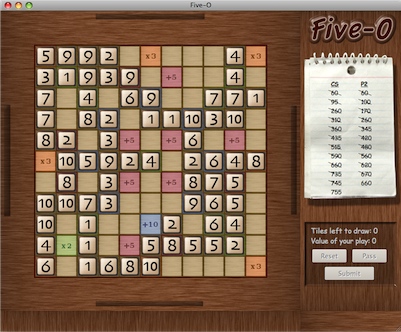Five-O Development Story
I’ve always thought that there were some big advantages to playing board games on a computer. There’s the automatic scoring, automatic shuffling, automatic set up and clean up with no small pieces to get lost, and, if you can’t find anyone to play against, there’s the option of playing against the computer. Back when I was in college, I took a course in artificial intelligence where we designed an AI for playing Connect 4. I enjoyed the project so much that, after it was done, I wanted to write another board game AI. But, this time, I wanted to design the board game too.
The first step was coming up with an idea for a board game. It was around this time that Sudoku was becoming really popular. I remember thinking about how Sudoku puzzles were a lot like crossword puzzles but instead of words and clues, they used numbers and logic. I wondered if other word games might work with numbers instead of words, and came up with the idea of creating a number game that would be played like Scrabble.
I’m certainly not the first person to come up with the idea of a crossword-style number game. In fact, I remembered playing a board game like this growing up. But, when I searched the Internet, I found that there weren’t any available for the computer yet. So, I decided to make one. I started by crafting the rules, mocking up a game board, and coming up with a catchy name, Five-O.
It didn’t take long to make the first playable prototype of my new game. It didn’t score your plays, it didn’t even check that they were legal plays, but it was good enough to see that Five-O had potential to be a really fun game. So, piece by piece, I wrote the rest of the code for setting up games, handling turns, and validating and scoring plays. And, once all that was in place, I wrote the AI code for the computer opponent. It was really cool to see it all come together.

A screenshot from the original Mac version of Five-O
After putting the finishing touches on Five-O, I spent some time looking for a publisher. Having no luck, I considered self-publishing through a new online store called MacGamesArcade. But, graduating from college, moving to a new city, and starting a new job soon consumed my time and Five-O sat on the shelf, unpublished.
Then, during the summer of ’08, I started developing iPhone games. The App Store was just what I needed to finally get my games out into the world. It meant learning Objective-C, Cocoa, and a whole new style of user interface design, but something about writing apps for mobile devices was just so much cooler than writing plain old computer games, so I dove in head first.
My first iPhone app was nothing to write home about. It was a Pac-Man style arcade game with simple graphics and gameplay. I considered developing a version of Five-O for the iPhone, but I just couldn’t imagine it being much fun on such a small screen, so I worked on other projects in the meantime.
When Apple introduced the iPad, my first thought was “I’ve got to get Five-O on that.” The large touch screen was going to be great for playing board games. And, with my experience developing iPhone games, I knew I could get the job done.
It took a lot of evenings and weekends, but I got Five-O working on the iPad. Through all the rewriting, refactoring, and tweaking, it matured into a nice little game, with decent graphics and a slick user interface. I want to thank the Ludum Dare community for helping me power through the final stretch of development. They ran an “October Challenge” for indie developers where the challenge was to finish a game and sell one copy before November 1st. I worked hard to meet that deadline, and I’m proud to say Five-O got its first sales on October 30th, 2010.
Since then, Five-O has been featured by Apple in the New & Noteworthy and What’s Hot sections on the App Store, and it has been lauded in reviews on several different websites. The success has been really encouraging, and I’ll just wrap up by saying thanks to everyone who has purchased Five-O or supported me in other ways. I plan to continue development on this game, and I’m excited to see how far I can take it.


Comments are closed.